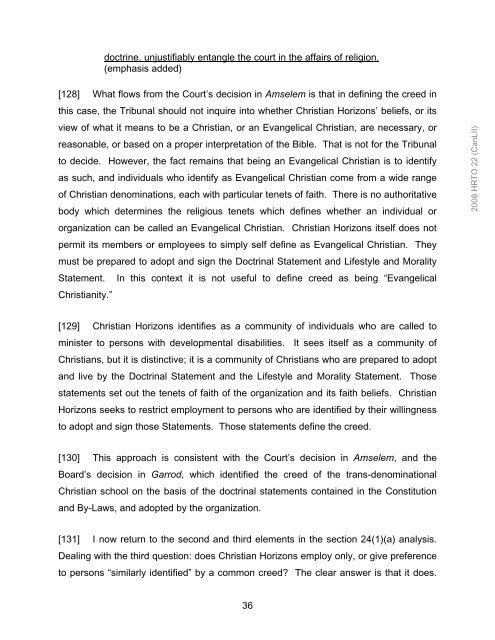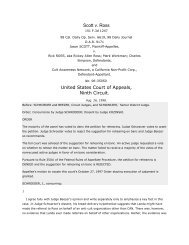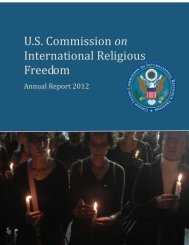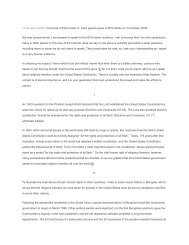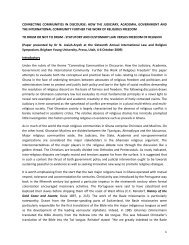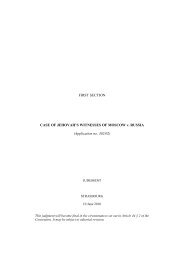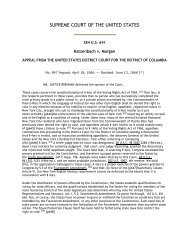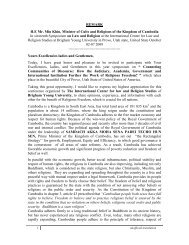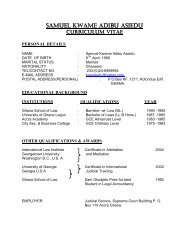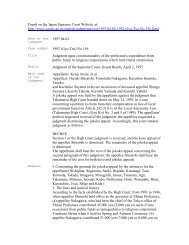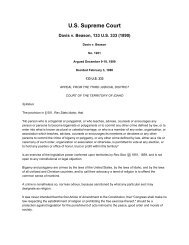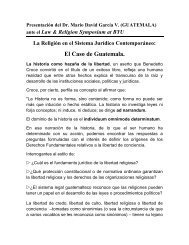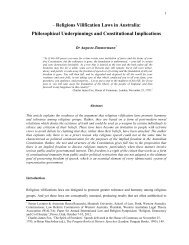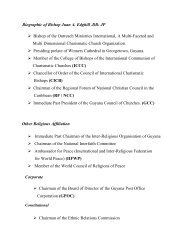Ruling (.pdf) - International Center for Law and Religion Studies
Ruling (.pdf) - International Center for Law and Religion Studies
Ruling (.pdf) - International Center for Law and Religion Studies
Create successful ePaper yourself
Turn your PDF publications into a flip-book with our unique Google optimized e-Paper software.
doctrine, unjustifiably entangle the court in the affairs of religion.(emphasis added)[128] What flows from the Court’s decision in Amselem is that in defining the creed inthis case, the Tribunal should not inquire into whether Christian Horizons’ beliefs, or itsview of what it means to be a Christian, or an Evangelical Christian, are necessary, orreasonable, or based on a proper interpretation of the Bible. That is not <strong>for</strong> the Tribunalto decide. However, the fact remains that being an Evangelical Christian is to identifyas such, <strong>and</strong> individuals who identify as Evangelical Christian come from a wide rangeof Christian denominations, each with particular tenets of faith. There is no authoritativebody which determines the religious tenets which defines whether an individual ororganization can be called an Evangelical Christian. Christian Horizons itself does notpermit its members or employees to simply self define as Evangelical Christian. Theymust be prepared to adopt <strong>and</strong> sign the Doctrinal Statement <strong>and</strong> Lifestyle <strong>and</strong> MoralityStatement. In this context it is not useful to define creed as being “EvangelicalChristianity.”2008 HRTO 22 (CanLII)[129] Christian Horizons identifies as a community of individuals who are called tominister to persons with developmental disabilities. It sees itself as a community ofChristians, but it is distinctive; it is a community of Christians who are prepared to adopt<strong>and</strong> live by the Doctrinal Statement <strong>and</strong> the Lifestyle <strong>and</strong> Morality Statement. Thosestatements set out the tenets of faith of the organization <strong>and</strong> its faith beliefs. ChristianHorizons seeks to restrict employment to persons who are identified by their willingnessto adopt <strong>and</strong> sign those Statements. Those statements define the creed.[130] This approach is consistent with the Court’s decision in Amselem, <strong>and</strong> theBoard’s decision in Garrod, which identified the creed of the trans-denominationalChristian school on the basis of the doctrinal statements contained in the Constitution<strong>and</strong> By-<strong>Law</strong>s, <strong>and</strong> adopted by the organization.[131] I now return to the second <strong>and</strong> third elements in the section 24(1)(a) analysis.Dealing with the third question: does Christian Horizons employ only, or give preferenceto persons “similarly identified” by a common creed? The clear answer is that it does.36


